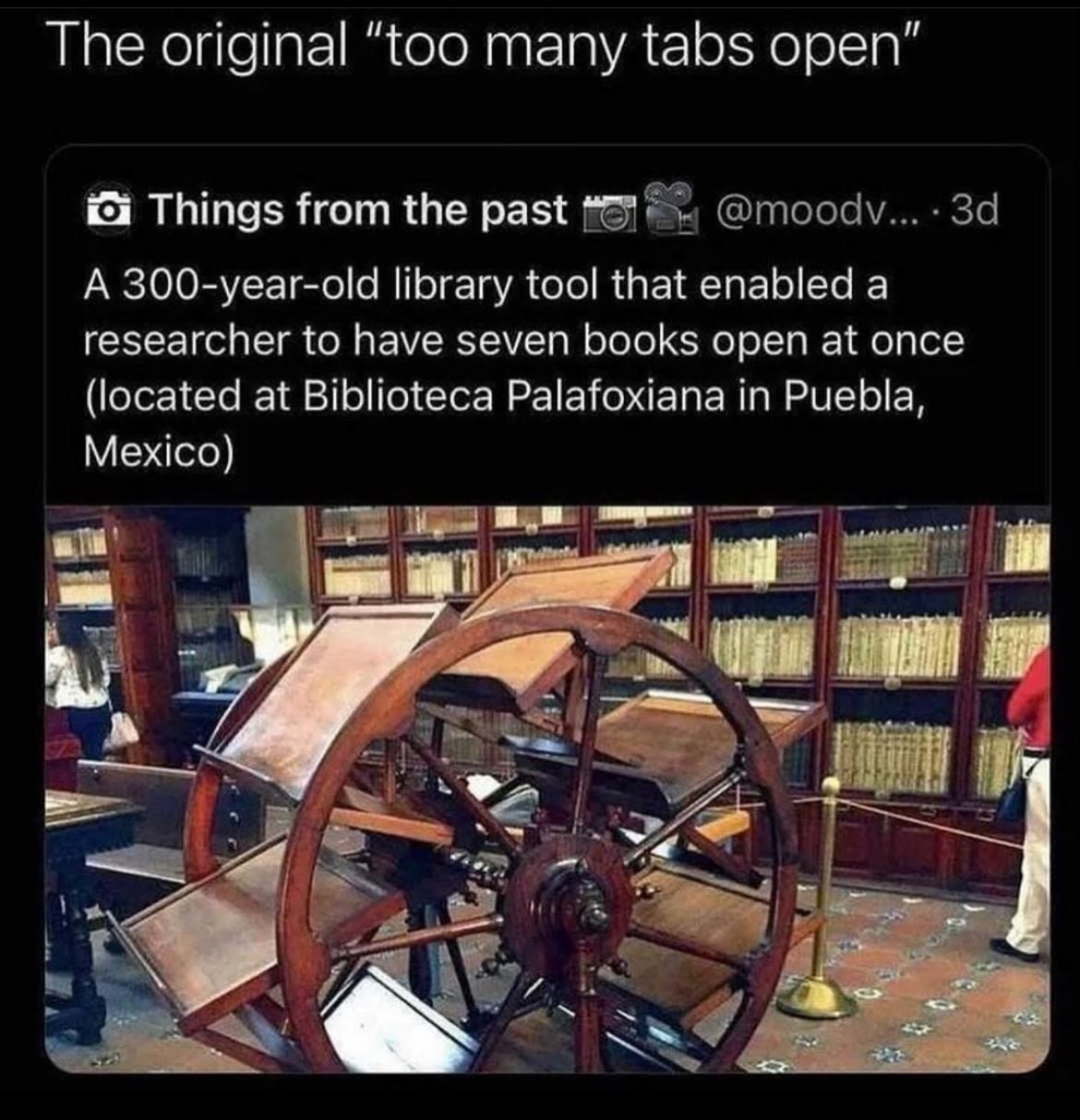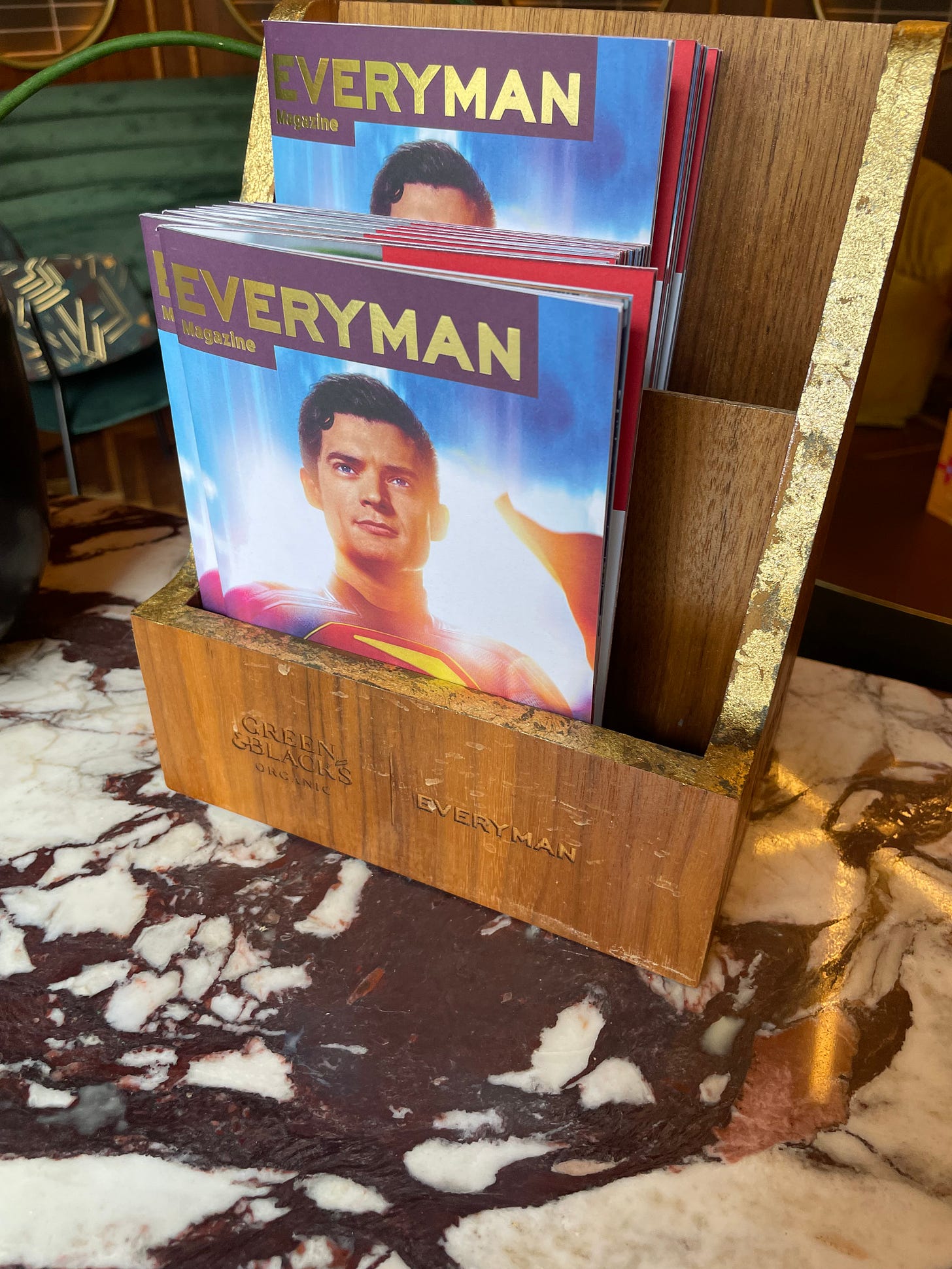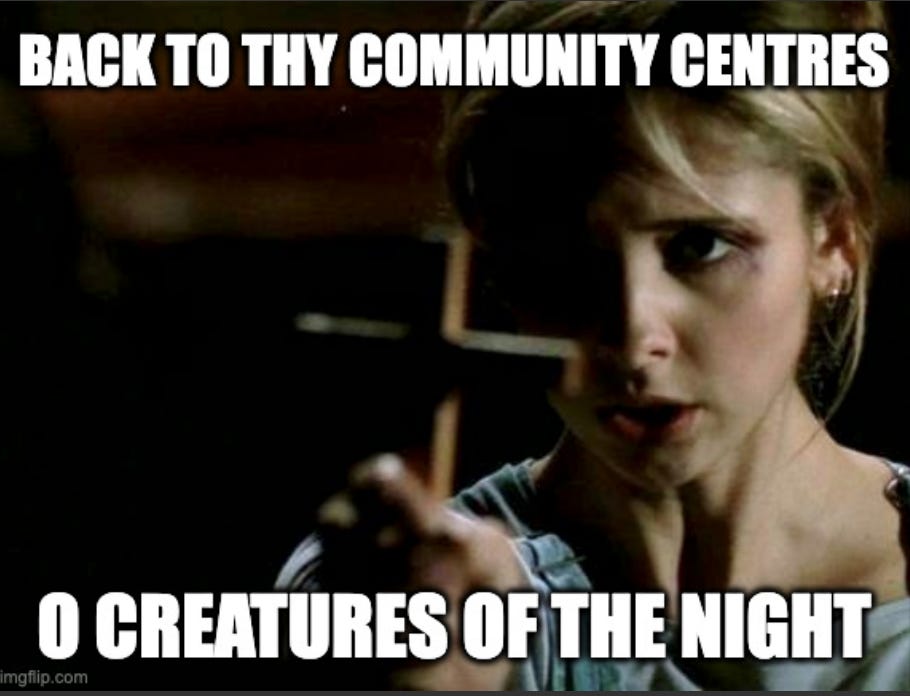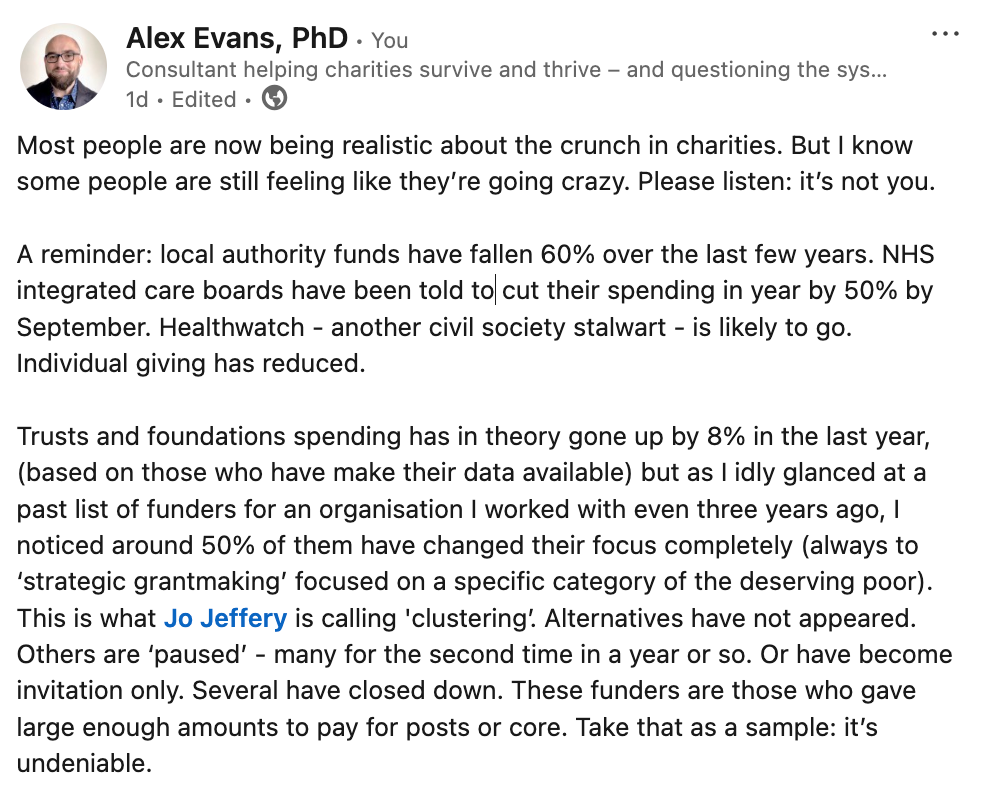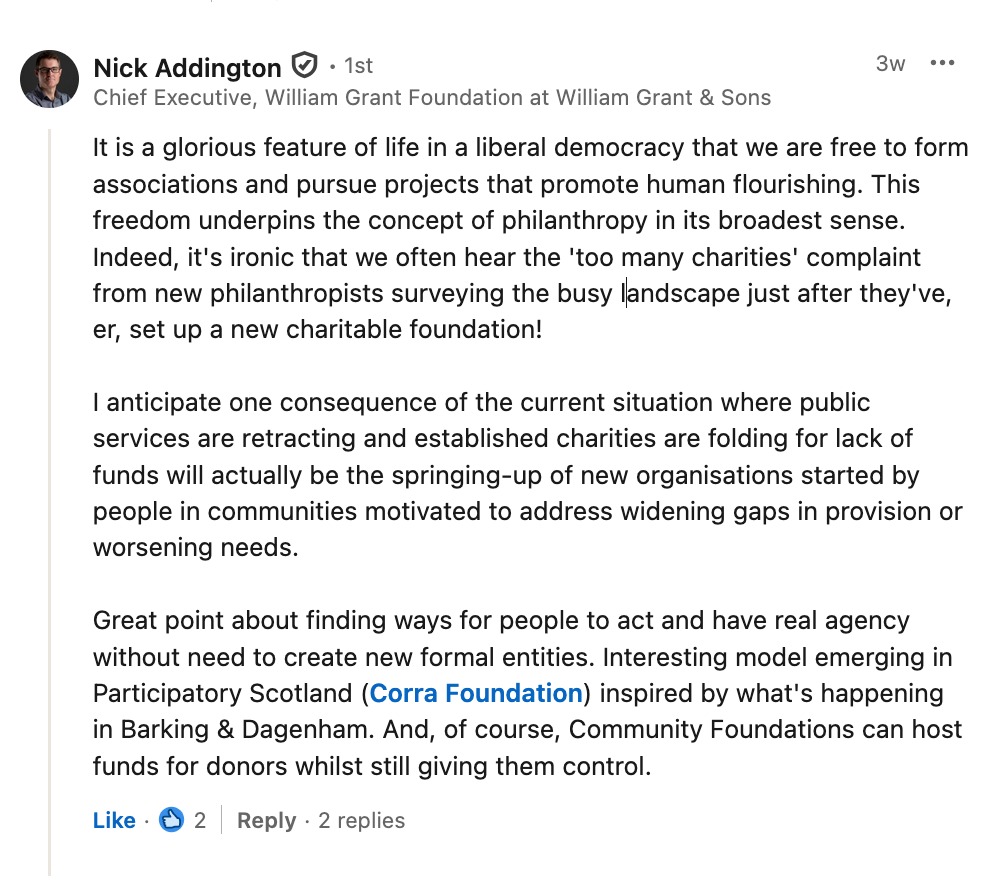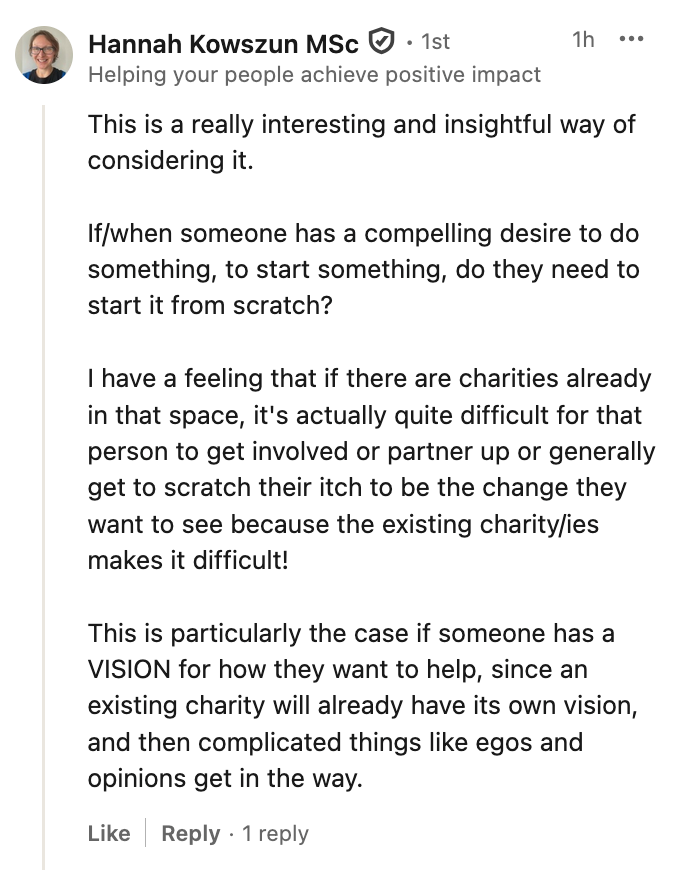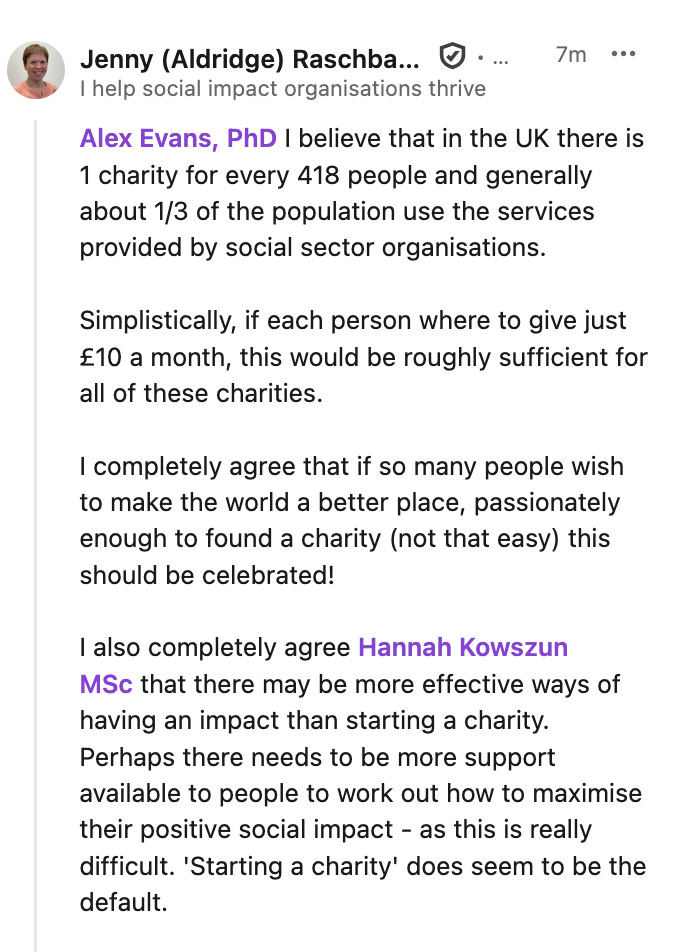UK Charity Crash: are there just too many non-profits?
It's crunch time. Who deserves a parachute? Also: Why do we distrust charities? - A historical take. Plus, Superman, Foucault, vampires.
The introductory preamble
Some general diarising this week, followed by a discussion of just how many charities/ non-profits we should have.
The funny personal bit, with the usual diaristic nonsense.
Suspicion and scorn: where does charity distrust come from? We look at why charities are so often considered to be parasitic and wasteful.
The long read: Are there too many charities? Since there is a contraction of the sector happening, some say there were just too many charities anyway. Why are there so many? Why do people keep setting up new ones? Which ones should receive financial support? And how should we decide?
The funny personal bit
Alas, this week is still not part two of ‘Beyond Charity’ as I promised. Failed again. But it’s not just me at least. I’ve been reading Michel Foucault’s lectures from 1979 at the College de France. He’s presenting his ongoing, developing research, and every week he says ‘In next week’s lecture, I will cover…’ The editor keeps writing in the footnotes, ‘Again, he did not keep this promise.’ Research is funny like that. It’s always a new can of worms.
At the moment, my floor (including the bedroom, where Michel Foucault is my second bedmate) looks like somebody has burgled a library - and then disappointedly discovered it’s just books and walked off mid-job. They would probably be just as disappointed as the people who burgled one of my clients last week. General advice to burglars: don’t burgle charities. Not for moral reasons, just because they don’t have anything worth nicking.
I’ve also been archiving and indexing old Barely Civil Society articles based on the subjects they cover. A few more focused greatest hits relevant to my more general noodlings today are included below.
Podcast pontifications
This week I talked to the fabulous Felicia Willow, the Mary Poppins of the Charity Sector, on the Benefact podcast, about class in charities. I was fairly measured until the end when I think maybe I went full Lenin. It was meant to be a soundbite but it sounded more like a war cry. Maybe it was.
Also, is ‘arse’ swearing? Asking for a friend.
Anyway look for it around September.
I should also be doing a podcast with a sector periodical in a couple of months about the growth of freelancing/ consultancy. I want to be very careful with that not to promote the uberisation of professional people in charities as something to be welcomed. At the same time, freelancers do a great job; and for some organisations, and people, it really works. But class comes into that too, as does gender. (I’ve written about this before here: Uberisation of the charity sector.)
One of the things I will talk about is how charity workers say they hate consultants because they believe they are just ‘in it for the money’. Hilarious.
Felicia asked me to introduce myself which is always my worst fear and weirdly always takes me by surprise. Inspired by the Mary Poppins branding, I said I was basically the charity sector Batman. By day, a mild-mannered charity consultant, and by night, the masked avenger righting third sector wrongs, fighting injustice, and calling out the powerful mostly by making mischief in social media and writing extended essays about critical theory on Substack. So, Batman, but 1) not a millionaire playboy 2) I can’t drive, Batmobile or otherwise and 3) I forgot the mask, and now my career is tanked. Also, 4) Batman doesn’t write a blog, and if he did, I suspect it would be a lot more right-wing.
However, in that latter fact, he is unlike Superman, subject of a masterpiece new movie, which I dragged my husband to see last weekend. I get extremely emotional about Superman. For all my Marxian table-banging and sardonic rage, I am really a big old softy, with a genuine belief in truth, justice and squirrels in capes (see it and you will understand). You can read more of my non-charity related thoughts on Superman here.
And now, onto the grown up stuff….
Suspicion and scorn: where does charity distrust come from?
But it’s always interesting when I have to make small talk with normal people who don’t necessarily want to talk about nonprofits, socialism, or superheroes.
This week, I went for a blood test, and the nurse asked me what work I did. When I said I worked for charities, she immediately said 'Well, I hope they are spending their money wisely. I think they waste it.' I had a really strong sense that she thought were a load of bloodsuckers, which is rich coming from a phlebotomist.
I read surveys saying public trust in charities is ‘high’ when it’s 6.5 out of 10 for trustworthiness. I mean, maybe that’s high compared to estate agents, but…. it’s not great is it? I don’t think I know anybody outside of my immediate friend or work group who doesn’t distrust them on some level. My elderly relatives think they’re lying chancers and thieves, despite the fact that they spend most of their life at various support groups, dances, and organised trips to garden centres.
The thing is, when people don’t trust us, or see our value, that then means that nobody is willing to stand up for us. But how can you spend hours a week at, say, a Parkinson’s support group and still think charities are a waste of time?
The Charity Commission has a lot to answer for here, as do the right wing press. I’ve talked about the Charity Commission’s role in this quite a lot: they take credit for high trust in charities when in fact they are actively stoking distrust. (Some more thoughts on the Charity Commission here: How the Charity Commission Talks to the Public and here: How to fix the Charity Commission.) This has worsened greatly over the last fifteen years with the Tory government’s demonisation of civil society as a whole. (See 14 years of incitement: civil society burns, and the right runs riot.)
[STOP PRESS: The Civil Society Covenant has been launched by Labour, 17th July 2025.]
But it’s also important to note that distrust of charities has a long history in England.1 I suspect this goes all the way back to concerns about priests and monasteries misusing money for almsgiving to supplement their own lifestyles. In the 14th C, for example, the church was losing respect because of its perceived worldliness - people saw fat and greedy priests (in fact, check out the Canterbury Tales on this one). Tithe money was partly meant to be used for the poor, but many churches just kept it for themselves. Henry V took action against this in the 1414 act, because people were dying for lack of care while the church took the money instead. This is when the first reforms were set up and inspections began.
At the same time, for centuries, trustees and regulators of charity have been even more careful about what happens to rich people’s money. An early concern was that the legacies of the wealthy, left to churches on the understanding that their souls would be prayed for, got what they’d paid for. (Imagine! All that property left to the priesthood, and I’m stuck in purgatory.) Nowadays, the Charity Commission, the press, and Fundraising Regulator often talk about protecting ‘the public’. But it’s very hard not to feel that much of the regulation - despite the public rhetoric - is primarily about protecting the money of the wealthy. Restricted funding is a direct result of those earliest historical agreements.
Both narratives also of course reinforce the idea that charities are greedy if they ask for too much, which again is of special concern to wealthy, particularly in times of neoliberal state rollback. That way lies taxation, and indeed, a danger that we might all start asking why charities have to solve all these intractable problems, born of grotesque inequality, with a tombola.
That’s partly why I tend to suggest that fundraisers are ‘dangerous’, not to ‘the people’, but to power and wealth: they draw attention to the wealthy, and know where the bodies (or treasure) is buried. Every time they make an ask, there is a danger that people will realise just how many resources are sucked out of our economy. Better to claim instead that charities, and all who are not profit-driven enterprises, are simply spongeing off ‘the rest of us’. (More on this here: Fundraisers are dangerous.)
Anyway, I told the phlebotomist all the charities I know are super careful, and that they were really struggling. At that point, she said she knew that and really appreciated them. So what do you say about that?
‘Conflicted’, I think. And probably about a 6.5 out of ten. It’s very hard for people to parse the negative messages they receive from politivally-motivated antagonists, despite their own largely positive personal experiences.
The long read: Are there just too many charities?
We’re all aware now - I hope - of a real crash being upon us in the UK’s nonprofit sector. If you haven’t been keeping up, take a look at my latest Linkedin post on this, or at the work of Jo Jeffery, also on Substack.
Recently, during the UK’s Small Charity Week, I asked what people thought about the idea of there just being ‘too many charities’. Because some say this crunch is just a ‘market correction’. And I’ve heard that said more and more, either by charities frustrated at the level of competition, grantmakers frustrated by the number of asks, or by baffled others looking on and unable to believe there is ‘really a charity for that’. The common suggestion is that they can’t all be ‘real’ or ‘needed’ or equally ‘deserving’. Some are creayting a narrative that this is a matter of a bloated industry, a drain on the public purse, and a nuisance for overscubscribed donors, particularly trusts and foundations and public funders.
But too many charities for whom? First, we might ask why a flourishing range of ways that people in our society have decided to try and do nice things for each other is a problem. It is a problem for an industry reacting to massive economic shocks and social disruption, and the ripples from a disastrously mismanaged economy, sure. And it is a problem in an unequal society where we have decided to concentrate wealth and resources in the hands of the meanest, greediest mofos. But why is it the fault of charities? There is a tendency for the holders of money to describe charities – overtly or covertly – as somehow demanding too much.
It's worth pushing back – because the sheer variety of charities reflects something valuable in and of itself. Multiplicitous, messy, multifaceted interests, viewpoints, activities, and actions are part of what civil society is. That’s not a bug, it’s a feature. And that is fundamental to a functioning democracy. As Nick Addington from the William Grant Foundation put it recently, one of the most profound and important facets of a liberal democracy is a thriving, diverse civil society. (I would add, even more so in a social democracy - where we could focus beyond meeting basic human needs.)
There’s a recurring fantasy – especially among those who hold the funds, like governments and major grantmakers – that all these charities could just merge, become more efficient, and stop being so awkward and numerous. Now look, some charity businesses probably should merge – that’s a question of finances, structures, and markets. It’s also sometimes a question of fragmentation and a refusal to work strategically. But that’s not the same as deciding what we should want in our society.
We shouldn’t let the scarcity of resources – or the preferences of funders – set the limits of what’s seen as valid or worthwhile. That takes us right back to the idea of who ‘deserves’ a charity in the first place. Yes, as Paul Streets says, all funding is ultimately rationing. But we don’t have to decide the shape of civil society around that – even if we have to make strategic decisions within it.
‘Too many charities’ for an industry or economy is not the same as too many charites for our society. Balancing those is tricky - but the distinction is important.
Why do people keep setting them up?
There is a realistic question though: why do people keep setting up new charities when there are perfectly good others doing ‘similar’ work? Why do community leaders keep setting up charities? I can’t deny that I’ve seen this happen over and over again.
There are good reasons. One is that an apparent duplication for a national observer is a profound difference in culture and community for another. Another is the value of different approaches - and sometimes different opinions and ideas.
But I also think a very common reason is because active citizens need to feel they're ‘doing’ something and it has official recognition. The problem is that the formal structures of our ‘charities’ often make it hard for anyone to really participate in civil society unless they do something completely new for themselves. We’re actually extremely exclusive in charities as institutions. Volunteering is a 'role' you apply for, is usually decided entirely by an organisation, and you'll be counting paper clips or directing traffic. Or, if you’re a ‘professional’ you might be lucky enough to do free consultancy or sit in Bored Meetings. Or, there may be a terribly paid job you won't get. I’ve heard people say this: people setting up food banks because existing charities won’t. People setting up their own activities for children because they have a new idea - and don’t want to just ‘volunteer’ to do crowd control at a youth club.
If we thought much more flexibly about how civil society, charities and active citizens relate to each other, and especially about our broken models of 'volunteering' which disempower communities and hoard power in organisations, we might avoid this problem more often. More and more, established charities need to ask - how can we help those who want to do something and have agency and autonomy? (It won't always work, but we don't do it enough...)
There's a really interesting blog recently I saw where Jason Lewis was talking about how 'philanthropy’ (particularly related to political giving, much more common in the US) has impoverished the political imagination in communities by making everything about giving, rather than connecting and creating and acting.... I think that’s true about volunteering too. And I think, since we give people no sense of leadership in much of our formal ‘charity’ work or volunteering, people choose to set up their own stuff. My own goal in the places I’ve run has often been to actually make organisations actively court, support, and nurture people to do their own thing. If you do that, the need for a whole new charity, or large amounts of overhead and effort, tends to greatly decrease for all but the most ambitious, and the positive impact is very significant.
The other thing we don’t talk about is that, at one point, there were more people around to ‘do’ the social, community, care work we now call the domain of charity. Once we started making everybody work an industrial week and then ensured all women and all men must be equally ‘economically productive’ we took away the opportunity for people to be socially productive…. Much of what we do now as paid charities is stuff that people would have done as part of their wider lives in the past (eg through churches, families. Unions, friendships).2 Civil society as a key part of democracy really took off in the 18th century, and participation was solely available to the wealthy middle classes who had control over their own labour and wealth. We might ask how much has changed. So in the current model, this is certainly why people want - need - to get paid for their work. When we say ‘not all charities can be funded’, we may be looking at the wrong end of the telescope. This is yet another reason that things like universal basic income, or even minimum income (which is essentially Universal credit but enough to survive on) could be socially as well as economically transformative.
Finally, perhaps choosing to set up your own charity enterprise is partly a justification: that I feel what I’m doing as a matter of social and public good is not valid or valuable unless it is ‘real’. We’re taught that economic productivity is the only ‘real’ source of pride. We are human capital, units of enterprise. We are only valued for the price of our labour. If that labour is not paid or recognised at least with some real legal status, it’s just a hobby. The leisure classes were of course the original ‘volunteers’ - they could have a hobby. Others could not afford one - and were not afforded the social dignity of ‘work’ unless they did so for the profit of a master.
Fragmentation and strategic grantmaking
Despite the calls for more charities to merge, we’ve seen an increasing fragmentation of grants into causes and interventions. Over the years we’ve seen the falling away of community anchor organisations (community centres and the like). They are the ones who have tended to provide a good deal of support for a wide range of needs in their local areas, and if anything, they are often sort of ‘pre-merged’, meeting mulrtiple needs with ‘services’ and projects. They have often worked with local people who might want to set up some kind of initiative themselves, and they often helped them to do so, without the crazy overwork of setting up a whole new charity. Funders who complain that there are far too many charities doing far too many things might think about whether they ought to be funding those kind of overarching ‘home’ institutions for social and community support instead.
What concerns me is that there is a fragmentation occurring, which has to do with the constant demand to focus, ration, define singular and simplifying objectives. That is becoming ever more concerning and likely as strategic grantmaking now has an almost total sway over UK civil society. ‘Strategic grantmaking’ is in theory the opposite of ‘responsive grantmaking’. In Strategic grantmaking, the funder acts essentially like a commissioner or procurer of services to meet the needs and services they have prioritised. Responsive grantmaking relies on what they receive as requests, and makes decisions more flexibly based on the idea that the ‘market’ (or ecosystem) will tell them what it needs. There is much to be said for either, and a mixed economy of both types has long worked. But a move towards strategic grantmaking is almost inevitable, especially when requests become overwhelming. Rationing is the order of the day, and in those cases, you think ‘strategically’ to control more directly where the resources go.
What this means, however, is that the majority of funding starts to focus on solving whatever particular and specific issue they have chosen: the best through consultation or needs assessment; the worst through what they’ve seen in the paper or their own idiotic prejudices. I was discussing this with arts fundraiser Kate Lockhart the other day: we focus so much on fixing a particular ‘social ill’ or supporting a particular category of the ‘deserving poor’ (asylum seekers, youth and women suffering domestic violence are current focuses in many funders - older people, substance misuse, community anchors are the major losers), that we forget how overlapping the key issues are. Poor housing, loneliness and socialisation, lack of advice or good information, lack of access to state support, disconnection, trauma and mental illness, a divided and unloving society…. Many of these things are overlapping and cross-cutting. Choosing by group and demographic is troubling and does seem to return to the idea of a revolving platform of the deserving poor.
And of course, grantmakers can then show trustees Big Line Go Up when they are measuring across the portfolio to be sure they are ‘making a difference’. That, I think, is actually the biggest driver of this: neoliberal models of statecraft infecting the sector through trusteeships. It mirrors governmental techniques for scale, which works against the key strengths of the more holistic history and habitus of civil society. In this, it’s as ever linked to a broader historical and political movement - returning to my current bedmate Foucault: this is the domain of what he calls ‘govermentality’.
There is also a danger that more fixes and interventions grow up for these few issues, while those for other issues waste away. When you choose a new issue, there’s nothing there to support it. At that point, you need to set up more new charities. Meanwhile, you also find that there are no systems, places, or connecting fabrics left between them - just a series of groups with a need for interventions. That tends not to work. (See my thoughts here on what I call ‘interventionitis’ Why headlines don’t make for good social policy and ‘Show us your widgets’.)
What this all leads to in the end is likely to be fragmentation, and indeed, more charities doing a few very specific, unconnected things. What I wonder is whether this kind of strategic grantmaking - focusing on highly specific out groups and causes - will simply distort the ‘market’, and remove the connective tissue of our communities. It may also lead to a loss of multi-faceted organisations who could support all of these things.
As a secondary impact, I also worry that this will increase the fragmentation of our societies: there are plenty of things we all need, and all have in common. I think sometimes we forget this, and the structures we create for help tend to obscure it. That way also lies the kind of fantasy divisions that Reform and the far right manipulate: refugees in the Ritz, trans people in your bog, and ‘the rest of us’ struggling to make ends meet or find somewhere for a slash. These people aren’t right, or indeed, smart, but they’re also fed complete nonsense and are very very angry. Often quite rightly. (On this, see my previous article ‘It’s not just about DEI.’)
Difficult decisions - and technocratic solutions
Overall, we see a strange demand for there to be fewer charities, an increasing fragmentation into ever smaller interventions, and the likely extinction of multifaceted organisations who would otherwise cover multiple bases, without the overheads of multiple different charities. If a consolidation is needed, my money would be going to the latter types of organisations and approaches.
People are all making difficult decisions. The crunch in the sector is leading to a lot more top-down thinking - a sort of war-footing where rationing is leading to a highly centralised and technocratic approach. This is an understandable response to the situation, but it is very much shaped by long-prevailing neoliberal ideas about how to deal with the ‘state’, and the management of populations. These are in some ways anathema to the strengths of civil society and embedded charities.
Because more and more I fear the ‘chairty sector’ is no longer part of civil society. More and more, charities are being turned into a substitute for a properly managed state, directed by private wealth, or privatised government contracts, run along the lines of, and though the techniques of ‘modern’ government of populations. The danger is that this is less democratic, less socialised, and less truly voluntaristic than ever before. It’s no surprise that much of the discourse, debate, policy and practice around ‘philanthropy’ come from the originating home of neoliberal statecraft: the US. A place, also, where there is almost no socialised health and social care.
Anyway, I’m going to ‘do a Michel Foucault’ now, and promise to return to this ‘in a future lecture’.
Maybe.
And finally…
Board meetings:
Instagram post of the week. (Sound on.) Mister Thunderpaws.
Barely Civil Society is about making the nonprofit world braver.
Here are three ways to help.
Subscribe
Share
Support this research
If you donate, you can help me spend more time researching and writing - including some bigger projects I’m working towards. Could you buy me a coffee?
Send me a message
The messages people send me every couple of weeks are my favourite thing. Drop me a line and say hi!
You can imagine that, given the tendency for elites to take over charities, this has continued as a concern, and seems to have been carried throughout history. Perhaps a structural matter, or perhaps simply distrust in the elites in charge. (I wonder if this same distrust exists in other places - although of course, charity does not exist to the same extent in other places.)
Traditionally, women did more of this ‘caring’ work. See:



